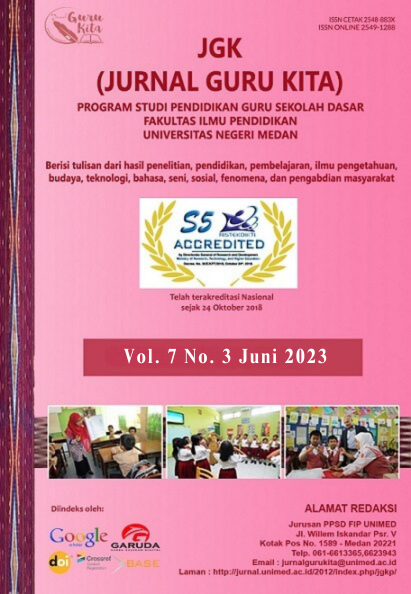PERAN GURU DALAM PEMBELAJARAN BAHASA INDONESIA PADA SISWA KELAS IV YANG BERKEBUTUHAN KHUSUS DI SDN 04 PALEMBANG
DOI:
https://doi.org/10.24114/jgk.v7i3.37056Keywords:
Teacher's Role, Indonesian Language, Students with Special NeedsAbstract
The Role of The Teacher in Learning Indonesian Language in Class IV Students with Special Needs at SDN 04 Palembang. The role of the teacher is not only to educate and teach, but the role of the teacher also guides and directs normal students in general and students with special needs without any differences. Based on this, the problem in this research is how the role of the teacher in learning Indonesian in grade IV students with special needs (autism) at SDN 04 Palembang. The purpose of this study was to find out how the role of the teacher in learning Indonesian in grade IV students with special needs (autism) at SDN 04 Palembang. The method used in this research is descriptive qualitative research method. The data collected by the researchers were observation, interviews and documentation. Data analysis uses data reduction, data presentation and conclusion drawing. The results of this study were through the observation of one of the students with special needs at SDN 04 Palembang and interviews with the fourth grade teacher and obtained the results that the teacher's role was very influential in the planning, implementation and evaluation stages in the Indonesian language learning process for one of the students with special needs. In the learning process the teacher uses simple methods, strategies and media which are averaged out with normal students without any difference because these students are in public schools not special schools (SLB). The teacher also has difficulty delivering material and has difficulty evaluating one of the students with special needs. The teacher's role is not only educating and teaching, but the teacher's role is also to guide and direct and provide motivation, enthusiasm and approach to one of the students who experience problems with special needs and normal students.References
Agustin, N. (2021). Peran Guru dalam Membentuk Karakter Siswa. Yogyakarta: UAD Press.
Bunga, M. K. (2020). Peran Guru dalam Mengelola Kelas Inklusif Anak Berkebutuhan Khusus STA. Maria Assumpta Kota Kupang. Jurnal Mahasiswa Pendidikan Dasar, 124.
Khoiry, A. Q. (2021). Peran Guru dalam Penanaman Nilai-nilai Pancasila pada Siswa Berkebutuhan Khusus di SLB Negeri Gunungsari. Jurnal Pendidikan Ilmu Sosial, 1.
Maemunawati, S. (2020). Peran Guru, Orang Tua, Metode dan Media Pembelajaran. Banten: 3M Media Karya.
Muhammad, H. (2021). Landasan Pendidikan. Makassar: Tahta Media Group.
Nafi'ah, S. A. (2018). Model-model Pembelajaran Bahasa Indonesia di SD/MI. Yogyakarta: AR-RUZZ MEDIA.
Nurfadhillah, S. (2021). Pendidikan Inklusi (Pedoman bagi Penyelenggaraan Pendidikan Anak Berkebutuhan Khusus). Jawa Barat: Jejak.
Nurfadhillah, S. (2022). Analisis Siswa Autisme di SDN Keroncong Mas Permai. Jurnal Keislaman dan Ilmu Pendidikan, 67-68.
Sandu, S. (2015). Dasar Metodologi Penelitian. Yogyakarta: Literasi Media Publishing.
Septiana, F. I. (2017). Peran Guru dalam Standar Proses Pendidikan Khusus pada Lingkup Pendidikan Formal (Sekolah Luar Biasa/Sekolah Khusus). Inclusive: Journal of Special Education, 131.
Pradita, L. E. (2021). Berbahasa Produktif melalui Keterampilan Berbicara. Jawa Tengah: Nasya Expanding Management.
Rahmawati, F. Y. (2020). Komunikasi Guru dengan Peserta Didik Berkebutuhan Khusus (Studi di SLB-ABD Negeri Tuban). Semantic Scholar, 2.
Ridwan. (2021). Pendidikan Anak Berkebutuhan Khusus. Jambi: Anugerah Pratama Press.
Sugiyono. (2016). Metode Penelitian Kuantitatif, Kualitatif dan R&D. Bandung: Alfabeta.
Downloads
Published
How to Cite
Issue
Section
License
Authors published with the JGK (Jurnal Guru Kita) agree to the following terms:
- Authors retain copyright and grant the journal the right of first publication with the work simultaneously licensed under a Creative Commons Attribution License (CC BY-SA 4.0) that allows others to share the work with an acknowledgment of the work's authorship and initial publication in this journal.
- Authors are able to enter into separate, additional contractual arrangements for the non-exclusive distribution of the journal's published version of the work (e.g., post it to an institutional repository or publish it in a book), with an acknowledgment of its initial publication in this journal.
- Authors are permitted and encouraged to post their work online (e.g., in institutional repositories or on their website) prior to and during the submission process, as it can lead to productive exchanges, as well as earlier and greater citation of published work. (See The Effect of Open Access)


























